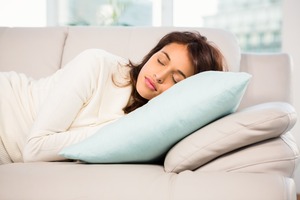
One of the many side effects of sleep apnea is that it can cause you to feel far more tired than normal during the day. As such, you’re likely to feel like taking a nap to catch up on your rest. But does napping actually help when you already have sleep apnea? Or might it cause additional problems? Here’s a closer look at the relationship between napping and sleep-disordered breathing.
What Happens When You Have Sleep Apnea?
Having sleep apnea means that your breathing is repeatedly pausing and unpausing while you slumber. This is most likely due to the airway becoming partially or fully blocked by relaxed tissues in your throat. Each pause can force your brain to pull your body out of the sleep cycle to get some air. Consequently, people with sleep apnea are often unable to get a full night of quality rest.
How Can Napping Affect Sleep Apnea?
Unfortunately, napping when you have sleep apnea may not be as beneficial as you think. By itself, napping cannot completely make up for the sleep you’ve lost due to sleep-disordered breathing. Furthermore, many people with sleep apnea find that they don’t actually feel better after taking a nap.
It should also be noted that napping can potentially throw off your sleep schedule, making it more difficult to fall asleep at night. This is a problem if you’re currently using some form of sleep apnea treatment. You actually want to be as tired as possible at bedtime so that you can fall asleep faster, which makes it easier for you to get used to your chosen treatment method.
What Can You Do to Address Sleep Apnea?
Napping may not be the best idea when you have sleep apnea, but there are other steps you can take to address the disorder. For example, if your case is mild or moderate, you can ask your dentist for a personalized sleep appliance. This simple device can change the position of your lower jaw, which can help prevent blockage of the airway.
On top of that, there may be a few changes you can make at home to reduce the severity of sleep apnea. For example, if you normally sleep on your back, it may help to transition to sleeping on your side. Doing so makes it less likely that your tongue and throat tissues will fall back and cause an airway obstruction.
Remember, it’s best to seek care from a professional as soon as you have reason to believe that you’re suffering from sleep apnea. Once the disorder has been diagnosed, it can be properly treated, and you’ll be able to enjoy a good night’s rest again.
About the Author
Dr. Torin Marracino has more than 15 years of dental experience. He studied dentistry at the University of Tennessee, and he holds membership with The American Academy of Dental Sleep Medicine. He provides fully personalized oral appliances for patients who are suffering from sleep apnea. To schedule a consultation with Dr. Marracino at Pleasant Grove Family Dentistry in Texarkana, visit his website or call (903) 838-9700.
